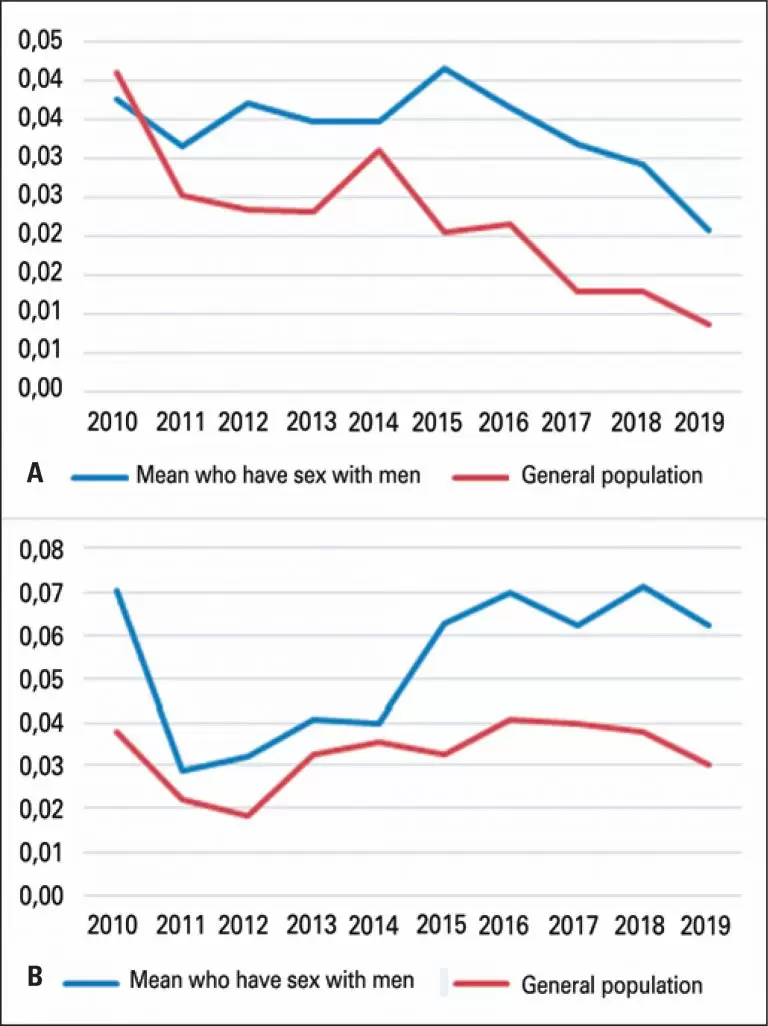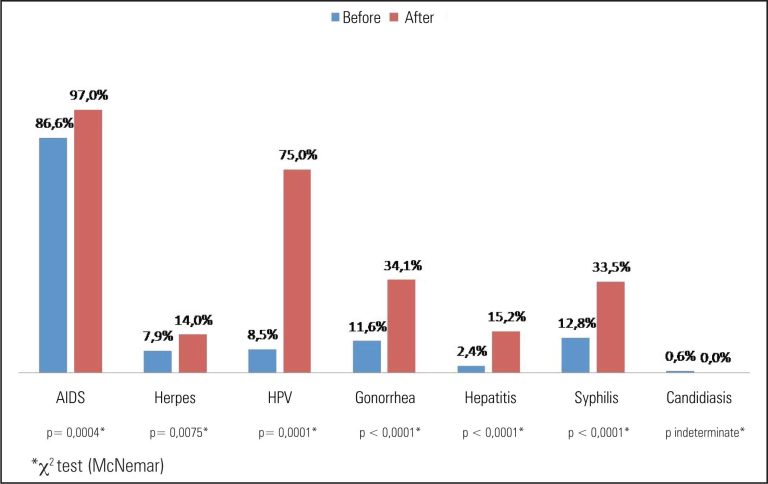01/Jun/2022
HIV, syphilis, hepatitis B and C in key populations: results of a 10-year cross-sectional study, Southern Brazil
DOI: 10.31744/einstein_journal/2022AO6934
ABSTRACT Objective: Although the development of prevention and treatment strategies for sexually transmitted infections in key groups has improved over the years, they still remain a challenge for health systems worldwide. In this context, the objective of this study is to assess the seroprevalence in the tested population, with an emphasis on key populations, aiming at identifying the participants’ profile and consequently the development of testing strategies. Methods: The present study analyzed the seroprevalence of HIV, syphilis, and hepatitis B […]
Keywords: Drug users; HIV; Homosexuality, male; Population groups; Sex workers; Sexual and gender minorities; Sexually transmitted diseases; Syphilis
08/May/2020
High prevalence of syphilis in a female prison unit in Northeastern Brazil
DOI: 10.31744/einstein_journal/2020AO4978
ABSTRACT Objective To determine the prevalence of syphilis and the associated risk factors in a female prison unit. Methods This was a cross-sectional study including 113 women whom data were collected in two stages: first, blood test to check for syphilis seropositivity; and then collection of information through a form to assess risk situations for sexually transmitted infections. Results Overall, syphilis prevalence was found to be 22.1% among the female prison population (n=25) and 28.6% among pregnant women. A statistically […]
Keywords: Brazil; Infections; Prisoners; Prisons; Sexually transmitted diseases; Syphilis/epidemiology; Women; Women’s health
10/Sep/2018
Sexual behaviors: study in the youth
DOI: 10.1590/S1679-45082018AO4265
ABSTRACT Objective: To characterize sexual behaviors in a sample of adolescents and youth. Methods: An analytical descriptive study using a questionnaire about sexual behaviors, adapted from the World Health Organization. It was distributed to students from a Portuguese city aged 14-24 years, during two months. Two age groups were defined: G1 – students aged 14-19 years; G2 – aged 20-24 years. Results: The sample included 2,369 students, 61% females and 70% in G1. The mean age of first sexual intercourse […]
Keywords: Adolescent; Contraception; Pregnancy; Sexual behavior; Sexually transmitted diseases
01/Jan/2014
Prevalence of sexually transmitted diseases in female athletes in São Paulo, Brazil
DOI: 10.1590/S1679-45082014AO2949
Objective : To determine the prevalence of sexually transmitted diseases in female athletes. Methods : An observational, cross-sectional study was conducted including 50 female athletes with mean age of 20±3 years. Colposcopy, pap smear, and polymerase chain reaction for Chlamydia trachomatis, human papillomavirus and Neisseria gonorrhoeae were performed. Blood samples were collected to test for the human immunodeficiency virus, syphilis, hepatitis B and C. The athletes presenting clinical diseases or conditions identifiable by laboratory tests were treated and followed up […]
Keywords: Papillomavirus infections; Real-time polymerase chain reaction; Sexually transmitted diseases; Sports medicine; Vaginal smears
01/Jul/2010
Impact of educational lectures on female adolescents’ knowledge about sexually transmitted diseases and cervical cancer in the city of Jundiaí, SP
einstein (São Paulo). 01/Jul/2010;8(3):285-90.
View Article01/Jul/2010
Impact of educational lectures on female adolescents’ knowledge about sexually transmitted diseases and cervical cancer in the city of Jundiaí, SP
DOI: 10.1590/S1679-45082010AO1544
ABSTRACT Objective: To evaluate the knowledge of adolescents living in Vila Ana and Morada das Vinhas region, in the city of Jundiaí, State of São Paulo, Brazil, on prevention and diagnosis of the main sexually transmitted diseases (STDs) and on cervical cancer, as well as the immediate impact of educational lectures. Methods: A prospective cross-sectional study was performed to assess the knowledge of a particular group of female adolescents about STDs and cervical cancer, by means of a questionnaire applied […]
Keywords: Knowledge; Sex education; Sexually transmitted diseases; Uterine cervical neoplasms



